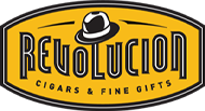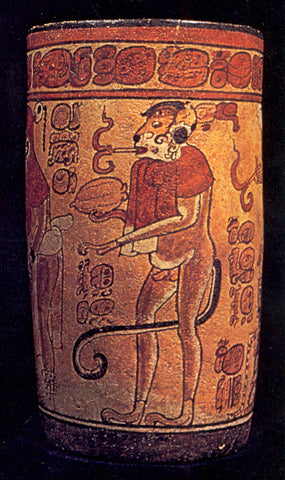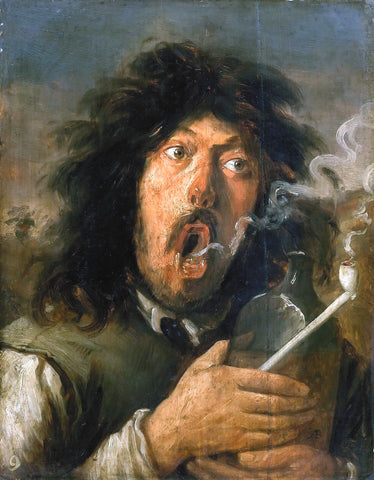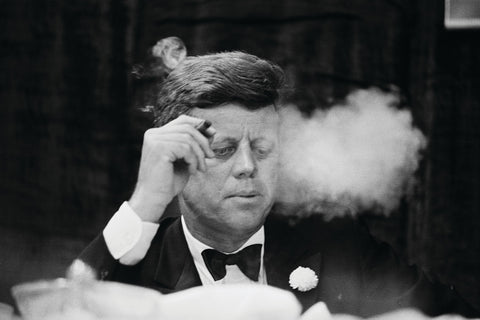Your Cart is Empty
NEED HELP SHOPPING? - GET EXPERT ADVICE
Menu

NEED HELP SHOPPING? - GET EXPERT ADVICE
Cigars - history and curiosities you never knew
September 18, 2019 6 min read

Tobacco and cigars are, of course, inseparable, so it makes sense to start with the history of tobacco to understand curiosities you never knew and how influential the Cuban cigar has been to the industry at large. Stay tuned: you might find it interesting!
The earliest historical record of the cigar is attributed to the ancient Mayans:
It All Starts with The Ancient Mayans
Most historians speculate cigars were invented around the 10th century BCE by the ancient Mayans, who would take tobacco, roll it into either a palm or plantain leaf, and then smoke it. The English word, “cigar,” derives from the Mayan word, “sikar,” which roughly translates to, “to smoke tobacco leaves.” (The Spanish word, “cigarro,” also, of course, derives from “sikar”).
The earliest depiction of smoking tobacco is found in Mayan art. Take, for example, something that came a little bit later than the original discoveries but certainly holds up much better: “The Vase of the Smoking Monkey” from the Classic period, roughly AD250 to AD900:

In this photo, a spidermonkey, possibly a representation of a Mayan god, smokes what appears to be either a cigar or a cigarette.
The ancient Mayans were probably the first to smoke cigars, but, as we’ll see, tobacco has a knack for quickly becoming ubiquitous across virtually all cultures.
The History of Cigars in Europe: Columbus Almost Throws It All Away…
As for tobacco’s introduction to Europe, that seems to have started in 1492 – when Columbus sailed the ocean blue. Legend has it that, on October 12th of that year, when Columbus landed in the Bahamas, he received a gift from the natives of San Salvador. He notes in his diary:
“The natives brought fruit, wooden spears, and certain dried leaves which gave off a distinct fragrance.”
Since the leaves were inedible, he threw them overboard.
A month later in Cuba, by observing the natives, two of his crewmates – one of them Rodrigo de Jerez – noticed what the leaves were really for: the residents would make rolls of palm leaves putting tobacco in it, light the other end, and “drink” the smoke out of the leaves. The term “smoking” was yet to be invented.
Rodrigo de Jerez: The First European Smoker
By following their lead, Rodrigo de Jerez, a Spanish crewman who sailed to the Americas on the Santa Maria with Columbus, became one of the first recorded non-native Americans to start smoking tobacco.

“The Drinking Smoker” by Joos van Craesbeeck
When Jerez brought his habit back to his hometown in Ayamonte, Spain, he was quickly imprisoned by the Spanish Inquisition. “Only Satan would be able to make people blow smoke out of their mouths,” they claimed.
And so, for the next seven years, the first European smoker wound up in jail because, well, people thought he was Satan.
In the meantime, smoking spread all over Europe. By the time Jerez was released from prison, cigars and tobacco were spreading like wildfire.
According to the University of Minnesota Libraries, “[Tobacco] arrived in France in 1556, in Portugal in 1558, in Spain in 1559, and in England in 1565. By 1571 it had spread to nearly all parts of Europe.”
Why Cuba, then? What makes the Cuban cigar so special?
Cuba has been producing cigars since the reign of King Philip II of Spain, starting sometime around the early 16th century. That means, as far as the history of cigars worldwide, the Cuban cigar was one of the earliest movers in the tobacco trade. Not long after Rodrigo de Jerez and the rest of the Columbus crew introduced Europe, and the rest of the world, to tobacco, Cuba started producing cigars en masse.
Factors that Differentiate the Cuban Cigar from the Rest
Experience – And a Hand-Crafted Attention to Detail
That means, now, Cuba has a centuries-long history of experience to draw from. Hundreds of years of hand-rolling cigars, paying extra special attention to the handling of the tobacco, analyzing – formally and informally – the different leaves that go into the cigar’s construction, and experimenting with different tastes and flavors – all of these factors make Cuba arguably the best, and most consistently high-quality, producer of cigars in the world.
Countries all around the world demand cigars from Cuba, and their experience and attention to detail are only a couple of the factors that set Cuban cigars apart.
Cuba: The Near-Perfect “Terroir” for Cigars
Also, many cigar aficionados argue that Cuba has a near-perfect mix of climate, topography, surrounding plants, and (of course) soil for producing high-quality tobacco leaves. These same factors, also known as the “terroir” of a region, are the exact factors that make an exceptional wine stand apart from the duds. Put simply: Cuban tobacco has a hearty, rich flavor that’s unique to the region. Cuban tobacco is in a league of its own, separate from the rest.
What else makes the Cuban cigar so special? Their availability (or lack thereof).
And that leads us to another point on the history of the Cuban cigar:
The US Trade Embargo Turns the Cuban Cigar into a “Forbidden Fruit”
President John F. Kennedy signed the Cuban Trade Embargo, which expanded Dwight D. Eisenhower’s previous trade embargo against Cuba, in order to cut off all ties to Fidel Castro’s Communist regime. According to FindLaw, it cut off trade and travel in Cuba, froze Cuban assets in the United States, and imposed sanctions on nations that offer assistance.
It also had the incidental effect of making the Cuban cigar an even hotter commodity. It’s a common feeling: as soon as you learn you can’t have something, you want it all the more. The “Forbidden Fruit” effect.
It’s also basic supply and demand. A combination of those factors might explain why, just hours before JFK made Cuban cigars illegal in the US, he had his head of press, Pierre Salinger, secure him “1,000 Petit Upmans.”

Nowadays, relations between Cuba and the US are warming – but JFK’s trade embargo is still largely in effect. The Obama Administration lifted the ban on Cuban cigars and rum, and now travelers can bring back as many cigars and as much rum as they want, provided they’re for personal consumption, not for sale.
Canada and the Cuban Cigar
The US-Cuban Trade Embargo is exactly why so many Americans come to Canada to buy Cuban cigars. According to Global News, many U.S. cigar shops carry “pseudo-Cuban cigars,” cigars that look Cuban but aren’t. There are only a limited number of travelers allowed to visit Cuba, and if you don’t qualify, your safest bet, as an American, is to come to Canada to buy Cuban cigars.
The History of the Cuban Cigar: Conclusion and Recap
To understand the importance and historical reach of the Cuban cigar, you have to start at the very beginning, with the ancient Mayans. Their artwork depicts the first records of cigars in the modern world, highlighting their ubiquity across cultures.
When Columbus sailed to the Bahamas with his crew, the natives of an island on San Salvador introduced him to tobacco, and, failing to find any use for it, he threw the leaves overboard. It wasn’t until a month later, when a couple of his crewmates (among them Rodrigo de Jerez), saw the natives “drinking” in the smoke from rolled-up and palm leaves. They tried it themselves, and the rest, at least in Europe, is history.
Cuba has a centuries-long history of delivering quality cigars, starting with the reign of King Philip II of Spain. Their reputation was further emboldened by JFK’s trade embargo, which cut off trade and travels in Cuba and posed sanctions on any nations that offered Cuba assistance, making the Cuban cigar an even hotter commodity worldwide because of its lack of availability and elevated status as a symbol of rebellion.
The history of the Cuban cigar is a complicated one that starts with the global history of tobacco and ends with a nation’s dominance over the cigar industry.
For these reasons and many more, Cuban cigars truly set a higher standard.
Leave a comment
Comments will be approved before showing up.
JOIN THE CLUB
Sign up to get the latest on sales, new releases and more …